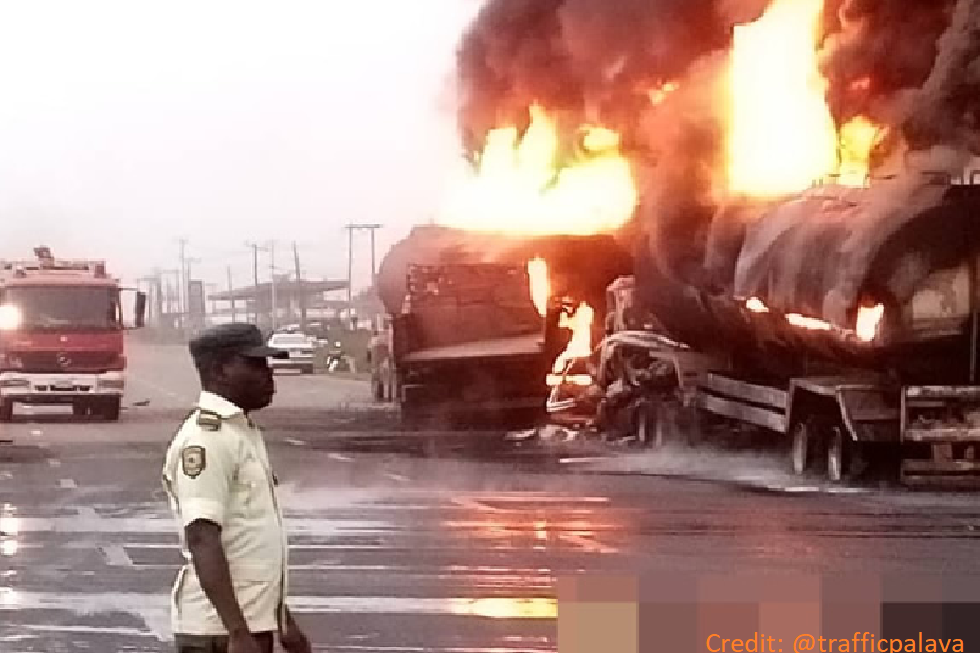Scene of the tanker explosion. Source: @trafficpalava,
Saturday’s tanker explosion at Dikko, Gurara LGA, Niger State, which claimed 98 lives is another grievous reminder of how the Nigerian government has repeatedly failed its citizens. Scores of people were also injured, and properties were destroyed. The Niger State Emergency Management Agency said the victims were buried in a mass grave.
Shortly after the tanker crashed atDikko Junction, it started spilling its contents. That was the precursor to the tragedy. Against commonsense, residents started scooping petrol. Some residents reportedly attacked security agents who initially prevented them from scooping petrol.
In the end, an explosion occurred. It incinerated 98 persons, injured 69 and pulverised 20 shops. This is a bad advertisement for Nigerians and their country.
Bashir Usman, a Dikko resident, said he lost three brothers. Adamu Ahmed said he lost six of his relatives, and friends to the disaster.
Similar tragedies have claimed 265 lives in the past five months. Forty-eight persons were roasted in a tanker explosion in Agaie, Niger State, in September 2024 and 144 others died gruesomely in another incident in Jigawa state in October. This is unacceptable.
In comparison, 27 people died in the destructive Los Angeles wildfires.
These recurring catastrophes, often resulting in significant loss of life and environmental damage, underscore the urgent need for a comprehensive approach to curb this menace. Addressing the issue requires tackling systemic infrastructure, regulation, and public safety failures.
Sadly, after a few days of mourning and government rhetoric, the dog returns to its vomit.
Therefore, beyond the tears and condolences, it is time for Nigeria to implement decisive measures to prevent these disasters.
The consequences of tanker explosions are staggering. Entire families are wiped out, businesses are destroyed, and communities are left to deal with toxic environmental fallout.
Tanker explosions are not merely accidents but symptoms of deeper systemic failures. Decades of neglect in critical areas—transportation infrastructure, regulation enforcement, driver training, and emergency preparedness—have created the conditions for these disasters to thrive.
Each explosion serves as a grim reminder of the consequences of inaction. Despite several reform pledges by the Federal Road Safety Corps, the roads are still awash with aged, poorly serviced tankers often unfit for the road. These vehicles, laden with highly flammable cargo, become ticking time bombs.
Tankers have become a clear and present danger to the public. While the FRSC is busy with ringworm, leprosy is destroying Nigeria. Instead of taking serious action against the tankers/drivers, the FRSC is chasing after cars with faded number plates.
The corps has been unable to enforce the installation of safety valves on tankers to check fuel spillage during accidents. The FRSC management has failed in this regard and cannot be absolved from blame for the explosions and loss of lives.
Poor roads remain one of the primary causes of tanker accidents. The Abuja-Kaduna Expressway is notoriously shabby, instigating motor accidents. The government must prioritise the repair and expansion of highways. Dedicated lanes for heavy vehicles and bypasses can reduce the likelihood of accidents.
The over-reliance on road transport for fuel distribution is a structural flaw. Investment in pipelines and rail networks can significantly reduce the number of tankers on the road, mitigating risks. Such investments demand immediate attention.
The FRSC and relevant agencies in the oil sector must enforce stringent safety checks on tankers and drivers. Routine inspections, combined with severe penalties for violations, will deter negligence.
Tanker drivers require specialised skills. So, mandatory training and periodic re-certification should be instituted. Transport unions must collaborate with regulatory bodies to ensure compliance.
Communities must be educated on how to respond to tanker-related emergencies. Public awareness campaigns can save lives by teaching residents to evacuate promptly and avoid hazardous areas.
Mourning is a natural response to losses, but thisshould be accompanied by action.
The Punch





